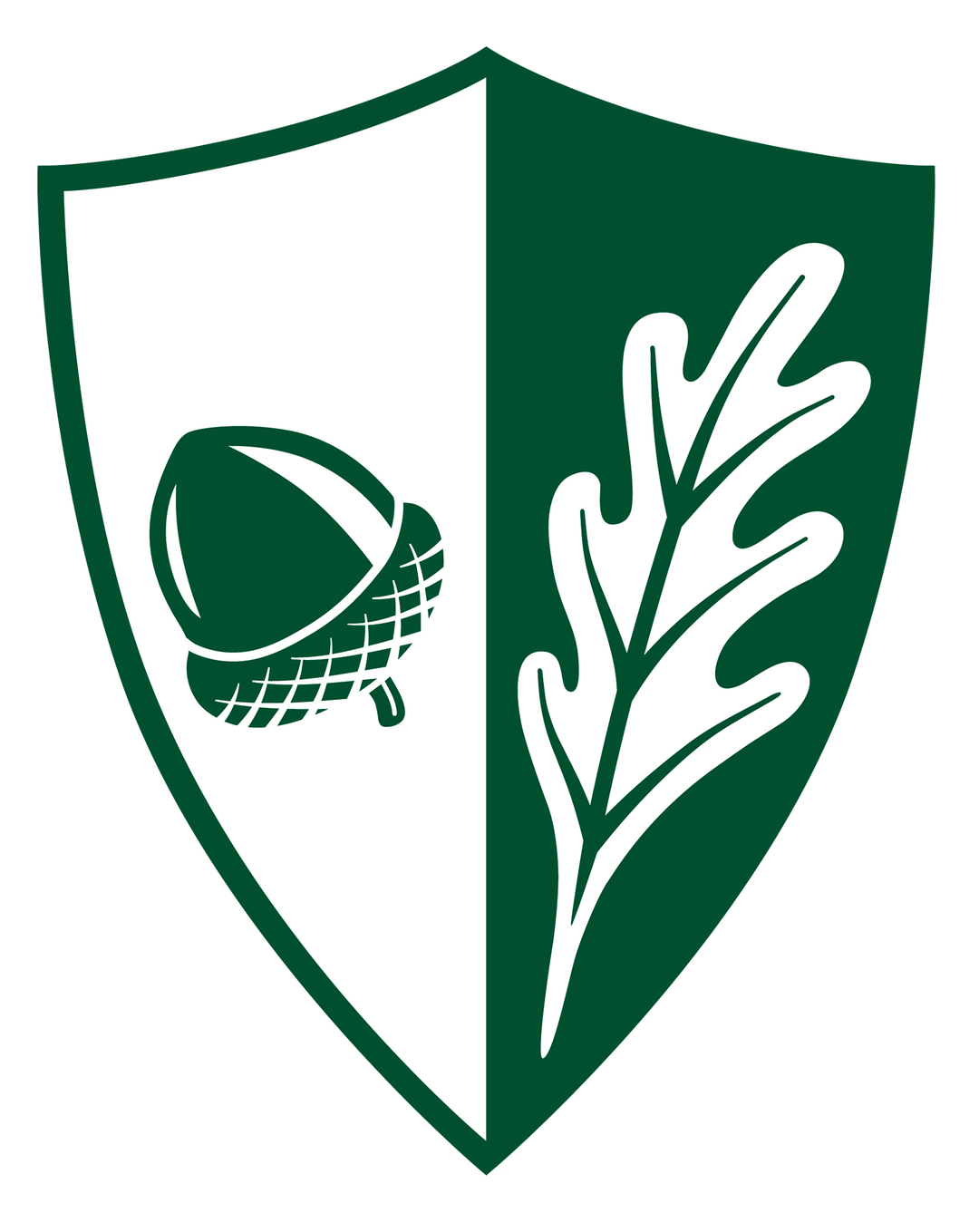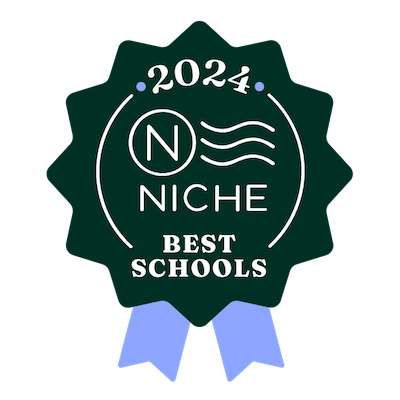Hospice
Making a Difference In and Out of the Classroom
Unlike this class, death is not an elective. Although it is one of two universal human experiences, our culture often ignores, denies, or misconstrues the true nature of death and dying. What happens when we bear witness to this natural process in the cycle of life and develop our ability to be fully present with others when they need us more than ever? It has the potential to change us deeply and fundamentally while shining a brilliant light on the path of our own lives.
With the support of their classmates, teacher, and comfort care home communities, senior students are offered the chance to care for others who truly need their purposeful, non-judgmental attention. In the home-like setting of a comfort care home, opportunities for learning extend beyond a traditional classroom rubric and conventional methods of evaluation. In this course, students will certainly find tangible “learning outcomes” by studying the medical/physical processes associated with dying and the basic nursing assistant skills of comfort care. The ultimate goal, however, will always be rooted in true relationships and connection, which occurs only through empathy and compassion.
Hospice Menu
Comfort Care Homes (External Links)
What is Hospice?
Advent House Living Room, Photo by Amelia Hamilton
Students practicing mouth care, Photo by Amelia Hamilton
Volunteering
- All volunteers are encouraged to complete one 4-hour shift per week.
- The ultimate goal of service work is building relationships, and students will find it more difficult to become comfortable and confident as a beginning volunteer unless they do the work consistently over time. One shift/week creates continuity of care and increases quality of life for the residents and their families.
- Students keep track of hours using the shift log, as well as the physical calendar in the CMEE.
Pasta Dinner Fundraiser
Each year, the Harley Hospice students organize a pasta dinner whose proceeds benefit the local comfort care homes. From beginning to end, the students plan the entire experience—designing the invitations, advertising the event, organizing the evening’s entertainment, planning for the meal and baking desserts, and writing speeches about what this class means to them. There is always a strong show of support from both the Harley community and the staff, volunteers, and family members from local comfort care homes.
Photo by Rachel Baum
In Their Own Words
Hospice lets you live your life that you have to its fullest.
It’s all about staying with them and making them feel comfortable.
We’re able to get deep down into what we’re feeling, what we’re experiencing, which is important when we’re dealing with things with death.
That aspect of not seeing death as a failure, just as a natural process.
Watching all these people when they have friends and family come, you’re not alone even at the end, even if they don’t have some of their family or friends with them there’s still the volunteers that are there for them.
Nothing gets out of that class, everything…It’s between us.
Curricular Elements
Confidentiality
What is said in the classroom stays in the classroom. The only exception to this rule is if there is fear someone may be in danger. Similarly, students will need to share information about someone they are caring for with the other members of the care team — nurses, other volunteers, etc. — and in the classroom use first names only when referring to residents and their family/friends. Although comfort care homes are not licensed facilities, the classroom should follow HIPAA regulations as closely as possible.
Group Sharing
Along with confidentiality and privacy, the practice of non-judgment and active listening are essential to creating a safe, open forum in class. As author Brene Brown tells us, “I define connection as the energy that exists between people when they feel seen, heard, and valued; when they can give and receive without judgment; and when they derive sustenance and strength from the relationship.”
Ritual and Meditative Practice
By lighting a candle at the beginning of class and blowing it out at the end, we acknowledge our proximity to death and invite death to our table. This also serves as a practice in being purposefully aware of what’s happening in the moment, without judging yourself and others. Drawing heavily from the mindfulness-based stress reduction (MBSR) program created by Jon Kabat-Zinn at the University of Massachusetts Medical Center, this course provides you with the opportunity to develop practical tools for self-care while actively participating in highly sensitive situations during your service work.
Reflective Journaling
From the first day of class until the end of the school year (and hopefully into the future), students will keep a hospice journal to document their experiences and maintain a log of their hospice shifts. This is an essential process for connecting experiences in the field back to the classroom and the course content.
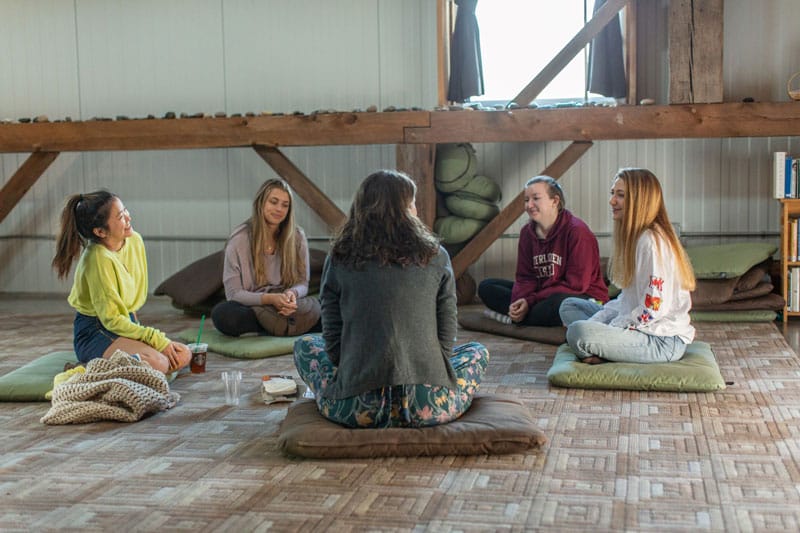
Trimester 1
Focuses on the tenets and history of hospice/palliative care, exploring Western culture’s attitudes/beliefs in regards to the end of life within a historical perspective, empowering volunteers with the core nursing assistant skills of hospice care, learning and practicing the psychosocial skills of being present with those who are dying/grieving, reflective journaling, group forming, and establishing connections with our local comfort care homes.
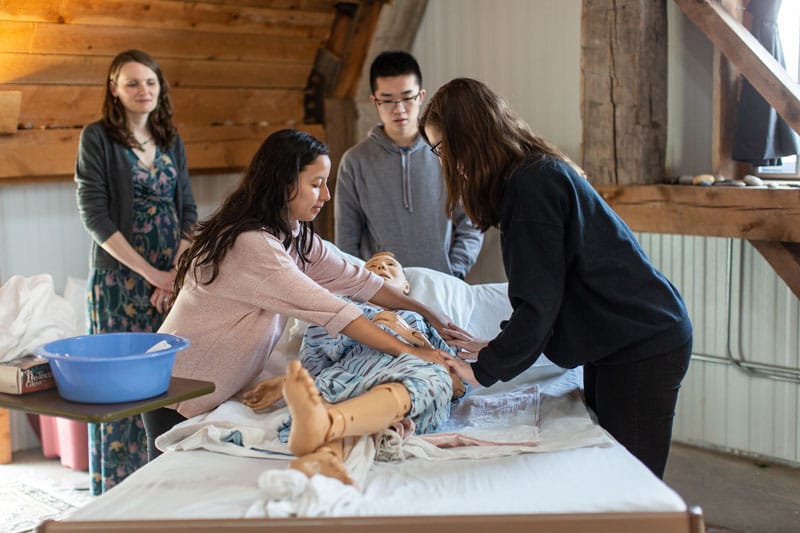
Trimester 2
Focuses on direct service to the dying residents of the comfort care homes and their loved ones. As students develop from a beginning volunteer to a valued member of the care team, they will be continually challenged to connect their experiences in the field back to the coursework.
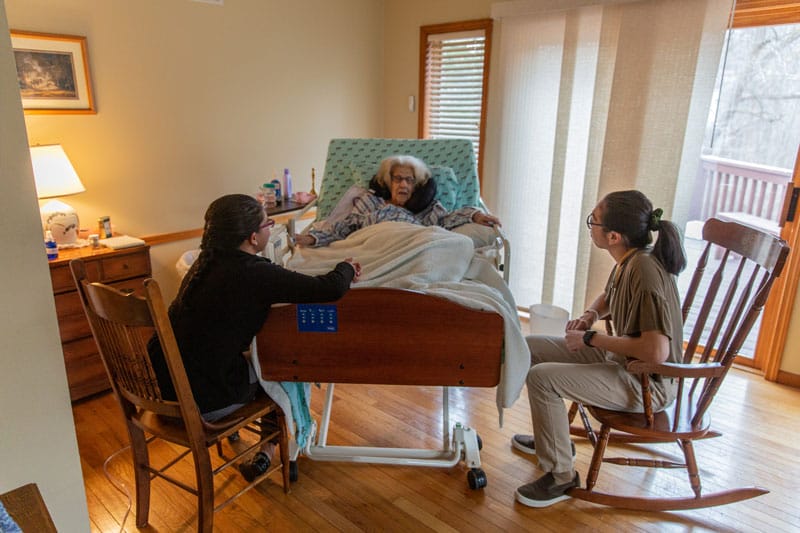
Trimester 3
Week-to-Week
Although the structure will vary depending on the particular subject and course work involved, the Hospice class will typically involve participating in lessons, discussion, and reflection from Monday–Thursday and participating in “Lab” (hands-on learning & practice) on Fridays.
Supplemental Readings
Students are encouraged to read from the following selection of materials
- Being Mortal creative nonfiction by Atul Gawande
- Tuesdays with Morrie memoir by Mitch Albom
- Wit one-act play by Margaret Edson
- The Five Invitations: What Death Can Teach Us About Living Fully by Frank Ostaseki
- Final Gifts: Understanding the Special Awareness, Needs, and Communications of the Dying by Maggie Callanan and Patricia Kelley
- When Breath Becomes Air by Paul Kalanithi
- The Tibetan Book of Living and Dying by Sogyal Rinpoche
- Being with Dying: Cultivating Compassion and Fearlessness in the Presence of Death by Roshi Joan Halifax
- Making Friends with Death by Judith Lief
Being Mortal by Atul Gawande, Photo by Amelia Hamilton
From left to right: Madeleine Baum, Sybil Prince, and Sophia Gardner. Photo by Amelia Hamilton.
Team Members
The Hospice site was curated by Madeleine Baum and Sophia Gardner as their senior Digital Humanities & Social Sciences capstone project at Rochester Institute of Technology.
Madeleine Baum, RIT Digital Humanities & Social Sciences Program
Sophia Gardner, RIT Digital Humanities & Social Sciences Program
Tamar Carroll, PhD, Faculty Advisor
Jessica Lieberman, DHSS Capstone Director
Sybil Prince, Harley CMEE Instructor
Sue Weisler, University Photographer
Photos by Amelia Hamilton Photography
©2023 The Harley School
Community Programs
Community Programs
Summer Programs
Driver Education
Afterschool
Extended Day
Adult Programs
Rentals
Key Programming
Science and Math Integration
Beyond STEM
Sustainability
Biomimicry
Maker Education
Project-Based Learning
Whole Learners
Social Emotional Learning
Civic Engagement
Mindfulness
Hospice
Arts
Visual Arts
Performing Arts
Giving
Supporting Harley
2023 Events
2021-22 Sustainability Challenge
Harley Fund
Planned Giving
College Counseling
 Harley’s Approach to College Counseling is highly individualized and student-centered. Students have direct access to college counselors throughout their Upper School experience, but really, each student is part of a team including faculty, administration, and staff. It’s our job to support each student and we want nothing more than to send students on to the next step of their journey at a right fit school for them. The student centered and driven process is wrapped in care, expertise, and professionalism.
Harley’s Approach to College Counseling is highly individualized and student-centered. Students have direct access to college counselors throughout their Upper School experience, but really, each student is part of a team including faculty, administration, and staff. It’s our job to support each student and we want nothing more than to send students on to the next step of their journey at a right fit school for them. The student centered and driven process is wrapped in care, expertise, and professionalism.
We host college reps during times students are available (no need to miss a class) so they can make connections and learn more about potential schools. We also arrange campus visits for classes as field trips, host an alumni college day (where recent Upper School graduates return to share advice and answer questions), and help connect students with our international alumni network. In fact, representatives from schools all over the world actively seek opportunities to come to Harley and meet with our students!
Our college counselors are accredited and are part of national/global conversations on admission trends. They also attend and present at conferences across the country.
Beginning with our Grade 11 parent night, we offer informational sessions for parents, including one devoted just to financial aid. Our partnership with families is critical, as the college admissions world changes very quickly and having an expert to guide students and families through the process is essential.
Clubs
 “Club Rush” is an afternoon every fall in the Upper School when students have the chance to sign up for clubs for the year, and each year it is very different because new clubs are created based on student initiative and enthusiasm.
“Club Rush” is an afternoon every fall in the Upper School when students have the chance to sign up for clubs for the year, and each year it is very different because new clubs are created based on student initiative and enthusiasm.
A few of this year’s choices: Sports Media, Social Action Club, Journalism Club, Feminism Club, Student of Color & Allies (SOCA), Gay-Straight Alliance, Tri M (music honor society), E-Sports Club, Euchre, Key Club (service), Animation Club, Dungeons & Dragons, Sustainability Club, Jewish Cultural Club, Astronomy Club, Biomimicry, and Beyond Soup (social justice/service).
Athletics
 Each and every year, students at The Harley School participate in HAC Athletics, and their success continues to be impressive, both as students and athletes. Our athletic program is an integral part of Harley, teaching student-athletes invaluable lessons about teamwork, time management, persistence, and competition. Our program allows them to develop physically, mentally, socially, and emotionally as they represent their school on and off the field. They grow, mature, and work hard to be the best teammate they can, while creating lifelong memories with teammates who often remain friends for life.
Each and every year, students at The Harley School participate in HAC Athletics, and their success continues to be impressive, both as students and athletes. Our athletic program is an integral part of Harley, teaching student-athletes invaluable lessons about teamwork, time management, persistence, and competition. Our program allows them to develop physically, mentally, socially, and emotionally as they represent their school on and off the field. They grow, mature, and work hard to be the best teammate they can, while creating lifelong memories with teammates who often remain friends for life.
Helping our athletes to reach their potential are some of HAC’s best assets: our coaches. More often than not, they are drawn from the ranks of our faculty and have a deep understanding of the personalities and abilities of the student-athletes on their teams.
We strive to find the right balance of academics, exercise, and personal growth for everyone. By offering a variety of sports at many different levels, all student-athletes find a sport they can be successful in. It is with great pride and pleasure that my team and I work to enrich the athletic lives of all our HAC student-athletes. Go Wolves!
To learn more check out our athletics page.
Student Leadership
 Our Upper School is filled with formal and informal opportunities for students to take on leadership roles. Whether following passions or learning new skills, student-driven opportunities take many shapes.
Our Upper School is filled with formal and informal opportunities for students to take on leadership roles. Whether following passions or learning new skills, student-driven opportunities take many shapes.
– Independent study: one trimester, full year, and multi-year projects have included automating our solar chimneys, coding handmade musical instruments, or developing a class on financial literacy for underserved high school students.
– Serving on student council
– STEM: Climate curriculum program, biomimicry program, NASA Hunch program
Clubs
“Club Rush” is an afternoon every fall in the Upper School when students have the chance to sign up for clubs for the year, and each year it is very different because new clubs are created based on student initiative and enthusiasm.
A few of this year’s choices: Sports Media, Social Action Club, Journalism Club, Feminism Club, Student of Color & Allies (SOCA), Gay-Straight Alliance, Tri M (music honor society), E-Sports Club, Euchre, Key Club (service), Animation Club, Dungeons & Dragons, Sustainability Club, Jewish Cultural Club, Astronomy Club, Biomimicry, and Beyond Soup (social justice/service).
Hospice
 Unlike this class, death is not an elective. Although it is one of two universal human experiences, our culture often ignores, denies, or misconstrues the true nature of death and dying. What happens when we bear witness to this natural process in the cycle of life and develop our ability to be fully present with others when they need us more than ever? It has the potential to change us deeply and fundamentally while shining a brilliant light on the path of our own lives.
Unlike this class, death is not an elective. Although it is one of two universal human experiences, our culture often ignores, denies, or misconstrues the true nature of death and dying. What happens when we bear witness to this natural process in the cycle of life and develop our ability to be fully present with others when they need us more than ever? It has the potential to change us deeply and fundamentally while shining a brilliant light on the path of our own lives.
With the support of their classmates, teacher, and comfort care home communities, senior students are offered the chance to care for others who truly need their purposeful, non-judgmental attention. In the home-like setting of a comfort care home, opportunities for learning extend beyond a traditional classroom rubric and conventional methods of evaluation. In this course, students will certainly find tangible “learning outcomes” by studying the medical/physical processes associated with dying and the basic nursing assistant skills of comfort care. The ultimate goal, however, will always be rooted in true relationships and connection, which occurs only through empathy and compassion.
Learn more about the Hospice Program at Harley HERE.
Capstone/Independent Studies
 This program utilizes environmentally-focused approaches to education and hands-on learning in order to foster the next generation of leaders through a lens of sustainability and problem-solving.
This program utilizes environmentally-focused approaches to education and hands-on learning in order to foster the next generation of leaders through a lens of sustainability and problem-solving.
Food & Farm: These year-long and trimester-long classes are held outside as much as possible, allowing students to become leaders in our various growing spaces. They cover environmental justice issues as well as hands-on work such as planning and overseeing planting, harvesting, and preparation of the gardens.
Past year-long focus projects have included: Creating a native plant shade garden in the Wild Wood area, redesigning our hydroponic system, overhauling Harley’s high tunnel, and improving the irrigation system for the MicroFarm.
Culinary Arts: These classes have a two-fold purpose: to give students practical skills in cooking and the science behind different techniques in the kitchen, learning about food justice, food sourcing, labor topics, and sustainability.
Past topics have included: Examining a plant-based diet, looking at the carbon footprint of different meals and food preparation methods, proposing a low carbon footprint menu to the dining hall, links between food labeling and environmental issues of food production.
Beekeeping: This one trimester class provides hands-on training in beekeeping, how to be a beekeeper, and safety and other techniques for working with bees. Once trained students help with all aspects of Harley beekeeping such as hive inspections, honey collection and extraction, and teaching students in Lower School about our hives.
Students pick a research topic addressing honeybee health and the larger environmental picture.
Social Justice
 At Harley, our students learn how to evaluate social systems in order to identify complex problems in society through a lens of social justice. They take a hands-on approach to working for a fair, equitable society by researching, exploring and evaluating different perspectives, and offering solutions—both theoretical and practical.
At Harley, our students learn how to evaluate social systems in order to identify complex problems in society through a lens of social justice. They take a hands-on approach to working for a fair, equitable society by researching, exploring and evaluating different perspectives, and offering solutions—both theoretical and practical.
Our faculty integrate social justice into our broader curriculum to assist students in gaining a foundational knowledge about what makes a democracy function. By gaining skills in ideating supportive pathways they become more exposed and experienced to how communities can undergo healing and restorative actions.
Capstone/Independent Studies
 Students may create independent studies with supervising teachers throughout their Upper School experience or, during Grade 12, they can design Capstone projects—intensive collaborations with Harley faculty and off-campus mentors—involving rigorous academic study and culminating in public presentations. They are empowered to create their own curriculum, set goals, and work on time management skills in order to accomplish their objectives.
Students may create independent studies with supervising teachers throughout their Upper School experience or, during Grade 12, they can design Capstone projects—intensive collaborations with Harley faculty and off-campus mentors—involving rigorous academic study and culminating in public presentations. They are empowered to create their own curriculum, set goals, and work on time management skills in order to accomplish their objectives.
Independent Studies run the gamut from The Psychology of Sports to Furniture Design to The Neuroimaging of Alzheimer’s Disease. Capstones, meanwhile, are as diverse as the students who pursue them: Fictional Rochester, Autobiographical Art, Biomimicry Education, Organic Fuel, and Rochester Refugees.
Indicative of Upper School curiosity and creativity, pursuits such as these distinguish our graduates in college. Through deep dives of this sort, Harley students master more than speaking, writing, and computing: they learn to communicate, advocate, collaborate, organize, listen, and empathize.
About
About Harley
Fast Facts
Our Faculty & Staff
History
Horizons at Harley
Dining Services
Key Programming
Science and Math Integration
Beyond STEM
Sustainability
Biomimicry
Maker Education
Project-Based Learning
Whole Learners
Social Emotional Learning
Civic Engagement
Mindfulness
Hospice
Arts
Visual Arts
Performing Arts
Main Menu
About
Academics
Key Programming
Enrollment
Community Programming
Alumni
Athletics
News
Giving
My.Harley
Enrollment
Enrollment at Harley
Enrollment Events
Virtual Tour
How to Apply
Affording Harley
Transferring to Harley
Refer a Students
Academics
Divisions
Academics at Harley
Nursery
Nursery 3
Nursery 4
Lower
Middle
Upper
College Counseling
Visiting Reps
Student Counseling
Library

